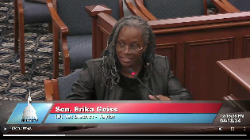From our friends at Safe & Just Michigan:
On Thursday, April 18, 2024, the Michigan Senate Civil Rights, Judiciary and Public Safety Committee voted Senate Bill 599, which fixes problems in the existing Medically Frail Parole law, out of committee and onto the floor of the Senate. A substitute was made to the original bill that included changes we found favorable, such as lengthening the prognosis someone can have to qualify for a medically frail parole from 12 to 18 months, and limiting the number of people who would be subjected to electronic monitoring.
SB 599 is a technical fix to the 2019 Medically Frail Parole statute that will enable the law — which has only resulted in one parole in five years since it passed — to function as intended. Safe & Just Michigan supports SB 599 because it will enable the Michigan Department of Corrections (MDOC) to parole medically frail people to facilities better suited to their needs, allowing the MDOC to focus on its core functions and save millions by shifting the costs of care to Medicaid from Michigan’s General Fund.
We urge the Senate to pass SB 599 promptly, as it will bring a needed avenue for medically frail people in MDOC. Prisons are not designed to house or provide medical care for medically vulnerable people, and placing medically frail people into more appropriate care settings will help alleviate current staffing concerns for health care staff and correctional officers within MDOC, and free up resources to invest in better outcomes for the rest of the prison population. Read more about this topic in our statement HERE.
The committee also voted the following bills to the Senate floor during the meeting:
- House Bill 4948: would prohibit a landlord from requiring a prospective tenant to disclose a criminal record that has been expunged or discharged through a diversion program like the Holmes Youthful Trainee Act, or certain court findings regarding unlawful acts as a juvenile.
- HB 4960: would prohibit employers, employment agencies, or labor organizations from requiring job applicants to disclose juvenile records, adult criminal records that have been expunged or discharged through a diversion program like the Holmes Youthful Trainee Act, or that the applicant was on probation.

(Sen. Erika Geiss, sponsor of Senate Bill 599, offers testimony before the Senate Civil Rights, Judiciary and Public Safety Committee on April 18, 2024.)

Leave a Reply